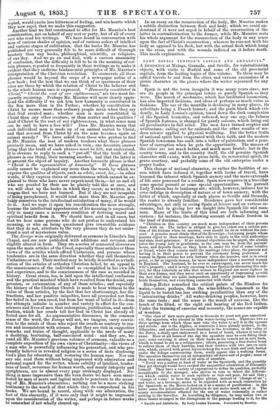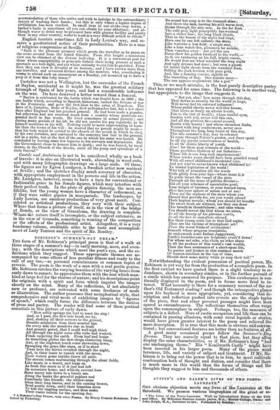LADY LOUISA TENISON'S CASTILE AND ANDALUCIA. * A RESIDENCE at Malaga,
Granada, and Seville, for valetudinarian objects, with visits to Madrid and some of the old provincial capitals, form the leading topics of this volume. To these may be added travels to and from the cities, and various excursions of a picnic character in the places where the writer sojourned for any time.
Spain is not the terra incognita it was many years since, nor are its people in the principal towns so purely Spanish as they were. The march of mechanics, which has facilitated locomotion, has also imported fashions, and ideas of perhaps as much value as fashions. The use of the mantilla is declining in many places, its substitute being a French bonnet; and the plain black which evi- dently, in Lady Louisa's opinion, toned down the dark complexion of the Spanish brunettes, and softened, may one say, the fulness of Spanish features, is changed for gaudy colours, which bring out all peculiarities in full relief. The men have turned sceptics and utilitarians; calling out for railroads and the other results of mo- dern science applied to physical wellbeing. But the better traits of national spirit have evaporated with their faith, and the modern Spanish townsman has sunk into a talker of patriotism and a prao- tiser of corruption when he gets the opportunity. The masses of the cities are not much better, and much more brutal ; but in the county towns, and in the country itself, the old genuine Spanish character still exists, with its pious faith, its reverential spirit, its grave courtesy, and probably some of the old enterprise under a proper leader. This change of national character, or rather the facilities of ac- cess which have induced it, together with books of travel, have lessened the interest which Spanish scenery and the mere externals of life once possessed for a reader. Spain now requires in a traveller some special pursuit or some special opportunities. The pursuit Lady Tenison has in landscape art ; which, however, induces her to over-indulge in description of nature or of town scenery, with the latter of which, especially at such places as Seville and Granada, the reader is already 'familiar. Residence gave her considerable advantages, not only in seeing Spain at leisure and on various oc= casions, but in giving her an insight into Spanish life and man- ners. Many of the traits of this kind are both informing and curious : for instance, the following account of female freedom in the land of duennas.
" Children in this country are much more independent of their parents than with us. The father is obliged to give his eldest son a certain por- tion of his fortune when he marries, even should he do so without his con- sent. A grandee must obtain that of the Sovereign ; but young people whose parents object to their marriage, have only to apply to the civil authorities and state their grievance. If no rational objections can be urged, the alealde takes the young lady or gentleman, as the case may be, from the parents' house, and deposits them, as they term it, under the roof of some relative or friend, where they remain until the marriage takes place, the parents not having it in their power to prevent the ceremony being performed. A woman in Spain retains her own fortune when she marries, and is in every point, as far at regards money, far more independent than a married woman in England. The husband, be he ever so extravagant, can never touch his wife's property ; and it is very amusing to hear Spaniaras discussing this sub- ject, for they entertain an idea that women in England are mere ciphers in their own homes, and they never omit an opportunity of impressing us with the fact that they are quite independent, and really manage their house- holds themselves, and everything connected with them."
Bishop Heber remarked the critical palate of the Hindoos for water, —nicer, perhaps, than the wine-bibber's, inasmuch as the liquid to be tasted has less striking peculiarities than any of the " intoxicating drinks." All water-drinking peoples, however, have the same taste ; and the sense is the result of exercise, like the touch of the blind, or the sight and hearing of the Red Indian. Under the training of exercise and necessity, the senses are capable of wonders.
"One class of men more peculiar to Granada we must not pass unnoticed viz. the aguadors, who abound in this water-loving town. There are two or three springs from which these men take the water to sell it in the squares and streets : one is the Algibes, or reservoirs I have already noticed, in the Alhambra; and another favourite fountain is the Avellanos, in the valley of the Darr_ ,o a shady spot embowered in a forest of hazel, whence it takes its name. Here at all hours of the day the aguadors may be seen filling their jars; some carrying it about on their backs in tin vessels set in cork bark, which is found to act as a refrigerator ; others, possessing a four-footed beast to relieve them of their burdens, load their donkics with two jars on each side, which, covered with green leaves to keep the water fresh and cool, buried under the foliage surmounting them, really appear like a walking forest. The aguadors themselves are an independent off-hand sort of people; some of them very amusing, and full of all sorts of anecdote. "Never was a nation so fond of water as the Spaniards, and the quantity they get through would have excited the unqualified admiration of Priessnitz himself. They have a variety of expressions to define its qualities, perfectly inexplicable to the stranger, who strives in vain to detect the differen- ces which entitle water to such epithets as rich and poor, fat and thin; change of water' is here the regular phrase, instead of 'change of air ' ; and water, as a beverage, seems to be regarded with as much veneration by the Spaniards as the Moors looked on it as a means of purification : in the latter sense the inhabitants of Andalucia do not make much use of it. The scanty accommodation afforded for the use of water externally is rather striking to the traveller. In travelling by diligence, he may notice two or three basins arranged in the diningroom or the passage leading to it, for the
• Castile and Andalucia. By Lady Louisa Yenisei'. Published by Bentley.
. •
accommodation of those who arrive and wish to indulge in the extraordinary luxury of washing their hands ; but this is only where a higher degree of civilization has been reached. In small inns in out-of-the-way towns, a barber's basin is sometimes all you can obtain for your ablutions; and al- though water to drink may be procured here with greater facility and purity than in any other country, water to wash is a-very difficult article to obtain."
English tourists sometimes fall in Lady Louisa's way, and re- ceive a goodnatured notice of their peculiarities. Here is a case of religious compromise at-Seville. "Such is the pleasant prospect which greets the traveller as he gazes on the scene around from the famed Giralda. From this height a miniature view can be obtained of the distant bull-ring. It is a convenient post for those whose susceptibility or principle forbids their being present at such a spectacle as a bull-fight, and yet whose curiosity would fain be gratified. From here they can view it divested of its horrors; and I have known more than one traveller, and reverend divines among the number, who, considering it wrong to attend such an amusement on a Sunday, yet mounted up to have a peep at it from-this lofty tower."
Castailos was not a Wellington, but the surrender of the French at Baylen, accidental as it might be, was the greatest military triumph of Spain of late years, and had a considerable influence on the war. Its hero deserved a better reward than a funeral.
" Baylen is celebrated for the battle which was fought here in 1808 ; the one battle which, according to Spanish historians, turned the fortune of war in the Peninsula, and gave the first blow to the arnis of Napoleon. The hero of it, Castailos, Duke of Baylen, died in September last, but a few short days after England lost her greatest general. He had been made a grandee, but otherwise had not received much from a country whose gratitude ex- pended itself in fine words. He lived sometimes in actual poverty; and during many periods of his life he did not receive his pay regularly, as he himself mentions in his will. Nothing could be more unpretending or bum- ble than the terms of his will : be desired that no parade might be made— that his body might be carried to the church of the parish in which he died, by his own servants, and conveyed to the cemetery and laid in the ground, not in a niche, but at the foot of the one in which his sister was buried. He concluded by leaving some few legacies to his servants and dependents. But the Government chose to honour him in death; and he was buried, by royal decree, in the Church of the Atocha, amid all the pomp and splendour of a state funeral."
Castile and Andalucia is not to be considered wholly as a book of travels : it is also an illustrated work, abounding in wood-cuts, and with many lithographic drawings on a large scale. Of these, the figures are by Egron Lundgren, 'a Swedish artist now resident at Seville ; and the sketches display much accuracy of character, with appropriate employment in the persons and life in the action. Mr. Lundgren, however, seems to have a turn for conventional or fashionable grace in his -female figures, which may interfere with their perfect truth. In the plate of gipsies dancing, the men are lifelike, but the young women have a character of refinement, as if they were rather males in masquerade. The landscapes, by Lady Louisa, are amateur productions of very great merit. Con- sidered as artistical .productions, they vary with their subject. Where that forms a picture of itself, as in the view of the bridge at Ronda, or the view of Grazalema, the drawing is complete.
nature itself is incomplete, or the subject extensive, as in the view of iiranada, something is wanting of the composition or the effects of the professional artist. Altogether, it is a very handsome volume, creditable alike to the taste and accomplish- ment of Lady Tenison and the spirit of Mr. Bentley.



























 Previous page
Previous page